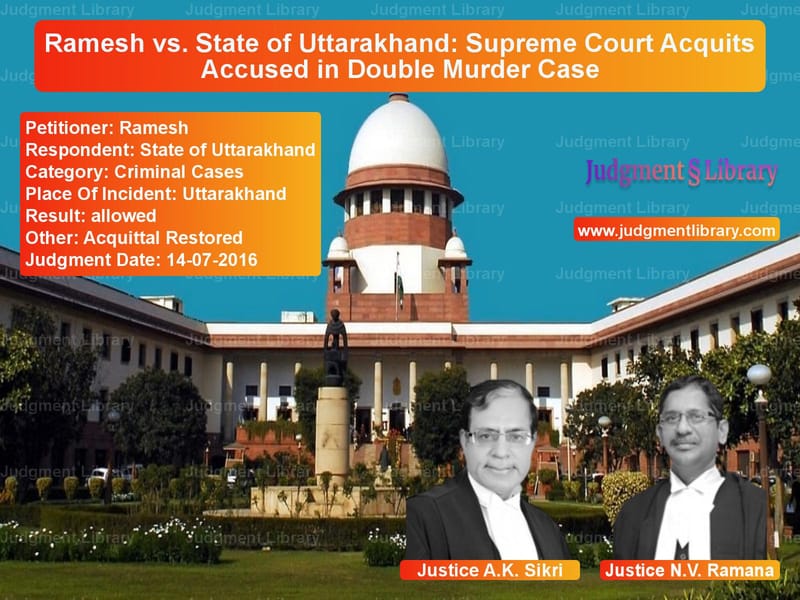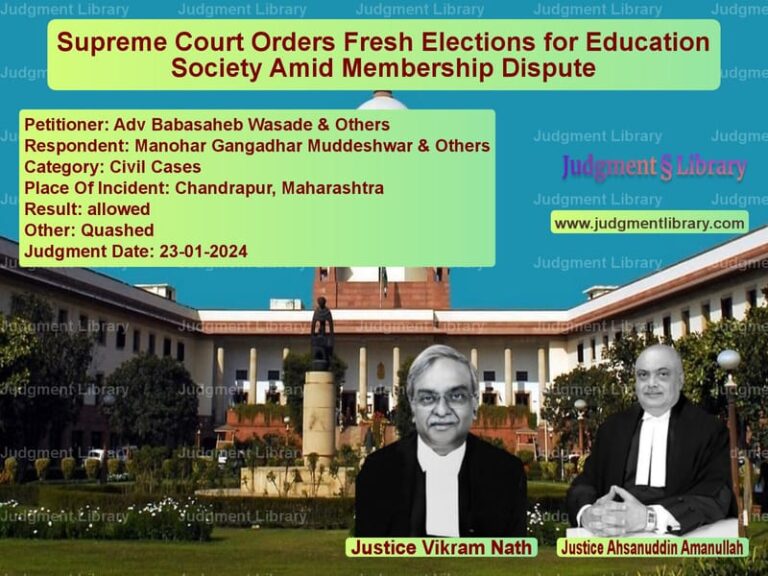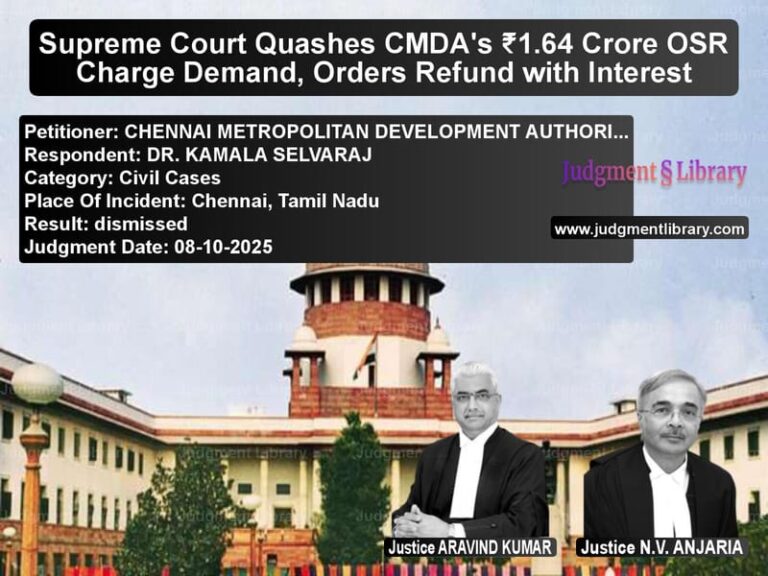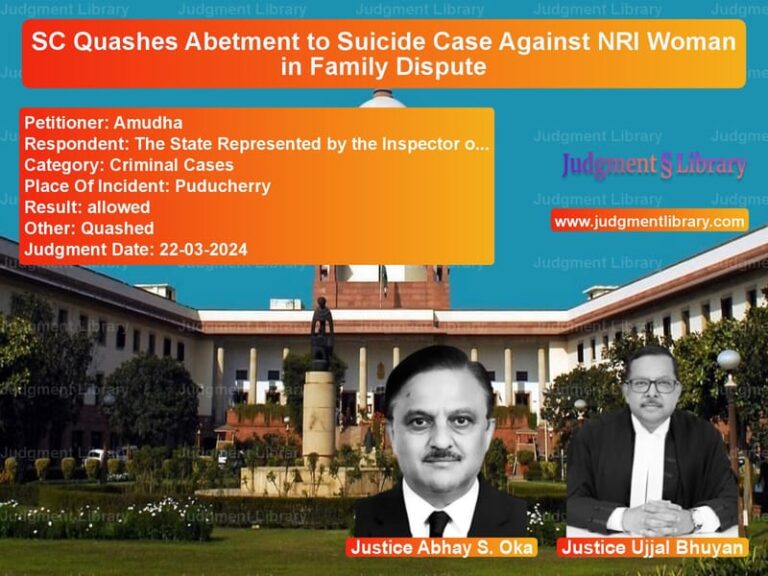Ramesh vs. State of Uttarakhand: Supreme Court Acquits Accused in Double Murder Case
The case of Ramesh vs. State of Uttarakhand revolves around a double murder that took place on the night of May 25, 1995, where the victims, Manoharlal and Hardeep Kaur, were killed in their farmhouse. The case involved a complex legal battle spanning multiple judicial levels, including the trial court, High Court, and Supreme Court, with key issues revolving around the reliability of eyewitness testimonies, the principle of burden of proof, and the standard required to overturn an acquittal.
Background of the Case
The prosecution alleged that the accused—Ramesh, Bhola, Paramjeet Singh, and Khalil—were involved in a conspiracy to murder the victims. The case relied heavily on the testimonies of two key prosecution witnesses:
- PW-2: A servant at the victims’ farmhouse who claimed to have overheard the accused planning the murder.
- PW-3: The nephew of one of the victims, who claimed to have witnessed the crime from an adjoining room.
Trial Court’s Findings
The trial court thoroughly examined the prosecution’s case and acquitted all the accused, citing the following reasons:
- There was no direct evidence linking the accused to the crime.
- PW-2’s testimony was unreliable because he claimed to have overheard a conspiracy to murder but did not warn the victims or anyone else.
- PW-3’s identification of the accused was doubtful, as he admitted that he could not properly see their faces.
- Forensic evidence was inconclusive in establishing the involvement of the accused.
- The prosecution’s case was riddled with inconsistencies and contradictions.
High Court’s Reversal
Despite these findings, the High Court overturned the acquittal, holding that the evidence presented by the prosecution was sufficient to convict the accused. It sentenced them to life imprisonment under Section 302 read with Section 34 IPC.
Supreme Court’s Observations
The Supreme Court reviewed the case and identified serious flaws in the High Court’s approach, highlighting the following key aspects:
- The High Court failed to provide compelling reasons for overturning the trial court’s verdict.
- PW-2’s conduct was unnatural—he claimed to have overheard a murder plot but did not report it to the police or his employer.
- PW-3 admitted that he could not properly see the attackers, casting doubt on his claim of witnessing the murder.
- The forensic evidence was weak and did not conclusively establish the accused’s involvement.
Legal Principles Established
The Supreme Court reaffirmed several important legal principles in this case:
- Burden of Proof: The prosecution must prove the guilt of the accused beyond a reasonable doubt.
- Presumption of Innocence: An acquitted person should not be convicted unless there are overwhelming reasons to do so.
- Standard for Reversal: A High Court should not overturn a trial court’s acquittal merely because an alternative interpretation of evidence is possible.
Key Extracts from the Judgment
The Supreme Court explicitly stated:
“The trial court’s judgment cannot be termed perverse. The prosecution failed to establish the guilt of the accused beyond reasonable doubt.”
Additionally, the Court emphasized:
“The High Court erred in reversing an acquittal merely because another view was possible. A reversal requires compelling reasons, which were absent in this case.”
Final Judgment
The Supreme Court ruled:
- The conviction by the High Court was set aside.
- The acquittal by the trial court was restored.
- The accused were ordered to be released immediately if not required in any other case.
Impact of the Judgment
This ruling reinforces key legal principles:
- An acquittal should not be overturned without compelling reasons.
- Testimonies must be scrutinized for inconsistencies and reliability.
- The burden of proof in criminal cases rests with the prosecution, which must establish guilt beyond a reasonable doubt.
Conclusion
The Supreme Court’s decision in Ramesh vs. State of Uttarakhand serves as an essential reminder of the necessity to uphold the highest standards of justice. The judgment ensures that wrongful convictions do not occur based on weak or contradictory evidence. By reinforcing the importance of credible evidence and the presumption of innocence, this ruling strengthens the criminal justice system in India.
Don’t miss out on the full details! Download the complete judgment in PDF format below and gain valuable insights instantly!
Download Judgment: Ramesh vs State of Uttarakhand Supreme Court of India Judgment Dated 14-07-2016-1741873065317.pdf
Direct Downlaod Judgment: Direct downlaod this Judgment
See all petitions in Murder Cases
See all petitions in Bail and Anticipatory Bail
See all petitions in Judgment by A.K. Sikri
See all petitions in Judgment by N.V. Ramana
See all petitions in allowed
See all petitions in Acquittal Restored
See all petitions in supreme court of India judgments July 2016
See all petitions in 2016 judgments
See all posts in Criminal Cases Category
See all allowed petitions in Criminal Cases Category
See all Dismissed petitions in Criminal Cases Category
See all partially allowed petitions in Criminal Cases Category







